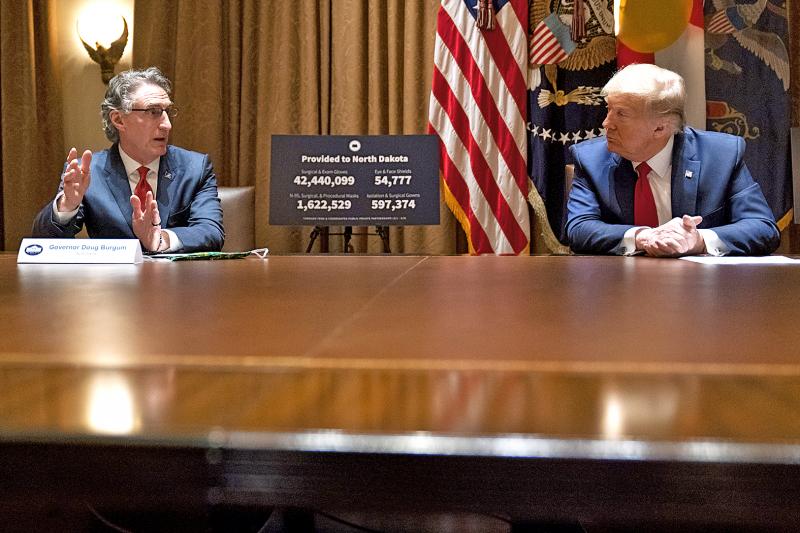US President Donald Trump on Wednesday extended for another year an executive order signed in May last year declaring a national emergency and barring US companies from using telecommunications equipment made by firms posing a national security risk.
The order invoked the US International Emergency Economic Powers Act, which gives the president the authority to regulate commerce in response to a national emergency.
US lawmakers said that Trump’s order last year was aimed squarely at Chinese companies such as Huawei Technologies Co (華為) and ZTE Corp (中興).

Photo: AP
The US Department of Commerce is expected to extend again a license, set to expire today, allowing US companies to keep doing business with Huawei, a person briefed on the matter said.
The department has issued a series of extensions of the temporary license and previously extended it until April 1.
Huawei, the second-largest maker of smartphones, is also a major telecoms equipment company that provides 5G network technology.
In March, the department sought public comments on whether it should issue future extensions and asked what was the “impact on your company or organization if the temporary general license is not extended?”
It also asked about the costs associated with ending the licenses.
Wireless trade association CTIA urged the department to approve a “long-term” license extension, writing that “now is not the time to hamper global operators’ ability to maintain the health of the networks.”
The association said that “ongoing, limited engagement with Huawei to protect the security of equipment and devices in the market benefits American consumers by reducing the risk that they will be subject to device compromise.”
It also asked the department to “reinstate and modify its prior authorization for standards development work to allow for exchanges with Huawei in furtherance of global telecommunications standards.”
The commerce department and Huawei declined to comment.
Since adding Huawei to an economic blacklist in May last year, citing national security concerns, the department has allowed it to purchase some US-made goods in a move aimed at minimizing disruption for its customers, many of which operate wireless networks in rural areas of the US.
In November last year, the US Federal Communications Commission designated Huawei and ZTE as national security risks, effectively barring their rural customers in the US from tapping an US$8.5 billion government fund to purchase equipment.

NEW IDENTITY: Known for its software, India has expanded into hardware, with its semiconductor industry growing from US$38bn in 2023 to US$45bn to US$50bn India on Saturday inaugurated its first semiconductor assembly and test facility, a milestone in the government’s push to reduce dependence on foreign chipmakers and stake a claim in a sector dominated by China. Indian Prime Minister Narendra Modi opened US firm Micron Technology Inc’s semiconductor assembly, test and packaging unit in his home state of Gujarat, hailing the “dawn of a new era” for India’s technology ambitions. “When young Indians look back in the future, they will see this decade as the turning point in our tech future,” Modi told the event, which was broadcast on his YouTube channel. The plant would convert

‘SEISMIC SHIFT’: The researcher forecast there would be about 1.1 billion mobile shipments this year, down from 1.26 billion the prior year and erasing years of gains The global smartphone market is expected to contract 12.9 percent this year due to the unprecedented memorychip shortage, marking “a crisis like no other,” researcher International Data Corp (IDC) said. The new forecast, a dramatic revision down from earlier estimates, gives the latest accounting of the ongoing memory crunch that is affecting every corner of the electronics industry. The demand for advanced memory to power artificial intelligence (AI) tasks has drained global supply until well into next year and jeopardizes the business model of many smartphone makers. IDC forecast about 1.1 billion mobile shipments this year, down from 1.26 billion the prior

People stand in a Pokemon store in Tokyo on Thursday. One of the world highest-grossing franchises is celebrated its 30th anniversary yesterday.

Zimbabwe’s ban on raw lithium exports is forcing Chinese miners to rethink their strategy, speeding up plans to process the metal locally instead of shipping it to China’s vast rechargeable battery industry. The country is Africa’s largest lithium producer and has one of the world’s largest reserves, according to the US Geological Survey (USGS). Zimbabwe already banned the export of lithium ore in 2022 and last year announced it would halt exports of lithium concentrates from January next year. However, on Wednesday it imposed the ban with immediate effect, leaving unclear what the lithium mining sector would do in the